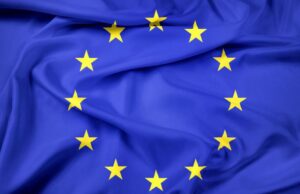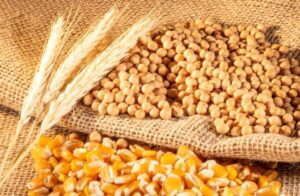
The full integration of Ukrainian business into the European market remains a key strategic goal of the Ukrainian Chamber of Commerce and Industry for 2024–2025. This was announced by the head of the CCI, Gennady Chizhikov, in an exclusive interview with the Interfax-Ukraine news agency.
“We are supporting the processes of certification, adaptation of logistics, labeling, and marketing materials for companies entering the EU markets. There are already specific cases where, thanks to this work, Ukrainian goods are being sold in Germany and Belgium,” Chizhikov said.
For more details, see the interview at https://interfax.com.ua/news/interview/1069297.html

Ukraine will receive €22.6 million from European partners to ensure nuclear safety, improve radiation protection, and manage radioactive waste, according to the Ministry of Environmental Protection and Natural Resources.
The relevant draft agreement on the 2024/2025 contribution was approved during a meeting of the Supervisory Board for the Implementation of the Instrument for Nuclear Safety Cooperation in Ukraine. The meeting was held on Friday by Minister Svitlana Grynychuk together with Jan Pane, Director for Nuclear Energy, Safety and ITER at the European Commission’s Directorate-General for Energy, and Inte Stockmann, Head of the Nuclear Safety Sector at the European Commission’s DG INTPE.
The agreed contribution agreement provides for the financing of a number of projects that are important for Ukraine. These include: ensuring backup power supply for the uninterrupted operation of radioactive waste management facilities, as well as the construction of the necessary infrastructure for the proper disposal of radioactive waste; the creation of an early warning system for forest fires in the exclusion zone; equipping a modern analytical laboratory for the analysis of radioactive materials in Chernobyl; restoring the functioning of the automated radiation monitoring system in the exclusion zone damaged by Russia during the occupation of the Chernobyl NPP.
In addition, there are plans to create a national integrated automated radiation monitoring system for the entire territory of Ukraine and integrate it with the European Radiological Data Exchange Platform (EURDEP), the European Community Urgent Radiological Information Exchange System (ECURIE), the International Radiation Monitoring Information System (IRMIS) managed by the IAEA; providing personnel of enterprises in the exclusion zone with adequate modern transportation and accommodation in the exclusion zone, as well as personal protective equipment and decontamination facilities in emergency situations.
Attention will also be paid to harmonizing Ukrainian legislation with Euratom standards as one of the conditions for Ukraine’s accession to the EU.
All measures are planned to be implemented over a period of five years.

Following the historic decision taken at the Samarkand Summit to establish a strategic partnership between Central Asia and the European Union, the region is already beginning to see the tangible economic results of this cooperation.
Under the EU’s Global Gateway program, an investment package worth €12 billionwas presented, covering four key sectors:
– transportation (€3 billion)
– critical minerals (€2.5 billion)
– hydropower and climate initiatives (€6.4 billion),
– satellite Internet (€100 million).
In addition, the European Bank for Reconstruction and Development is developing a portfolio of projects worth about €7-8 billion to support transport, critical minerals, and renewable energy development, to be implemented by 2027.

In 2024, Ukraine increased its exports of agricultural products to the European Union by 11%, according to the EU’s report on trade in such products last year.
“The EU continued to import agricultural food products from various trading partners, with Brazil, the United Kingdom, and Ukraine being the main sources. Imports increased from Côte d’Ivoire, Ukraine and Nigeria, while they decreased from Russia and Australia,” the report, the full text of which is published on the European Commission’s website, says.
According to the published statistics, Ukraine was the third source of imports of agri-food products to the EU in 2024 (8% of the total value of imports). Agricultural imports from Ukraine to the EU increased by 11% compared to 2023 (+EUR1.3 billion) and reached EUR13 billion. This was mainly due to an increase in the share of two key commodities in imports: vegetable oils (EUR3 billion in 2024, +EUR946 million compared to 2023), and oilseeds and protein cereals (EUR3.1 billion, +EUR709 million).
At the same time, imports of Ukrainian grains to the EU decreased by 12% in value (to EUR 4.5 bln) due to lower prices, but their volume increased by 6% year-on-year.
At the same time, the total volume of European agricultural imports in 2024 reached a record high of EUR171.8 bln (+8% compared to 2023, or +EUR12.4 bln).
In terms of consumption of European agricultural exports, Ukraine ranks 13th with EUR3.634 billion, which is about 2% of the EU’s total agricultural exports (EUR235.4 billion). At the same time, in terms of consumption of European imported agricultural products, Ukraine showed an increase of 5% compared to 2023, when the country imported agricultural products worth EUR3.461 billion from the EU.

European and international financial institutions are ready to invest more than 10 billion euros in the development of the Trans-Caspian transport corridor, EU High Representative for Foreign Affairs Kaja Kallas said at a press conference in Ashgabat, Turkmenportal.com reported.
“The development of the Trans-Caspian Transport Corridor is a major ongoing project. European and international financial institutions are ready to invest more than 10 billion euros in this project,” Kallas said during a press conference on the 20th European Union-Central Asia Ministerial Meeting held in Ashgabat on March 27.
Kallas emphasized the growing desire for cooperation between the EU and Central Asian countries.
The EU plans to expand cooperation in various areas, she said.
Kallas emphasized the development of youth exchanges and strengthening contacts in business and academia.

In 2030, Ukrainian biomethane producers will be able to supply up to 1 billion cubic meters of this fuel to the EU, says Maciej Zaniewicz, Green Deal Ukraine project expert, senior analyst at Forum Energii (Poland), who is a co-author of the study “Potential for Cooperation between Ukraine and the EU in the Field of Biomethane” by Green Deal Ukraine and the Ukrainian Climate Office.
“In our opinion, as well as in the opinion of Ukrainian analysts, the real volumes of biomethane production in Ukraine can be plus or minus 0.5% of EU demand. We are talking about about 1 billion cubic meters of biomethane in 2030,” Zanevych said in an interview with theInterfax-Ukraine energy project Energoreforma.
According to him, the most interesting thing in the study on the potential for cooperation in this area was that Ukrainian biomethane has already found buyers at market prices in the EU.
“At the same time, demand in the EU is so high that Ukrainian imports will not hinder the development of the industry within the EU,” the expert believes.
At the same time, he notes that Ukrainian biomethane “will not become some kind of export hit for Ukraine and a panacea for the EU.”
“What I mean is that it will not fully replace natural gas imports to the EU. Yes, it is an important component for diversifying gas supplies, but it will not completely replace imports,” Zanevych explained.
He also drew attention to the risk that pro-Russian circles will try to sow disinformation, “as it was with the trucks, as it was with the farmers.” “That allegedly Ukrainian biomethane producers will displace European producers. That’s why we wanted to make a reliable analysis based on objective data and show how it can actually be,” the expert said.
As reported, the first batch of Ukrainian biomethane of 67 thousand cubic meters was exported on February 7, 2025 by Vitagro, an energy holding whose plant with a capacity of 3 million cubic meters of biomethane per year operates in Khmelnytsky region. The exports were made to Germany.
On February 11, MHP’s biomethane plant Oril-Leader (Dnipropetrovs’k region) exported 27.4 thousand cubic meters of biomethane and became the second Ukrainian company to do so. MHP exported biomethane via gas pipelines across the Ukrainian-Polish border to Germany. The buyer was Vitol. The capacity of Oril-Leader is 11 million cubic meters per year.
The Gals Agro agricultural holding has built a biomethane plant with a capacity of 3 million cubic meters in Chernihiv region. The company has already been connected to the grid and is preparing to export its products.
At the Ukrainian Investment Congress in Kyiv in early March, Georgii Geletukha, Chairman of the Board of the Bioenergy Association of Ukraine (BAU), said that Ukraine could soon become the main supplier of biomethane to the European Union, with the share of Ukrainian products in the European market reaching 20% in the future.
Geletukha emphasized that Europe aims to consume approximately 35 billion cubic meters of biomethane in 2030, while European production is currently estimated at 3 billion cubic meters. Given the current market trends, the EU will be able to increase its own production to 20 billion cubic meters of biomethane within five years.
The expert explained such a delay in the development of the biomethane market in Europe by the lack of large free areas of agricultural land and, accordingly, the inability to produce the necessary amount of raw materials for processing.
He drew attention to Europe’s new plans for 2030, which include the production and consumption of 100 billion cubic meters of biomethane by 2050. However, it will not reach this figure because of the lack of raw materials, the expert believes.
According to his assumption, if Ukraine were to produce up to 15 billion cubic meters of biomethane now, the EU would “buy everything with a bang.”
According to him, in Ukraine, the range of biomethane producers and potential exporters will expand in 2025. They will be joined by another MHP company, Teofipol Energy Company, and Józefów-Mykolaiv Biogas Company. In total, Ukrainian facilities will produce 111 million cubic meters of biomethane per year.
At a cost of EUR900 per 1 thousand cubic meters of biomethane produced from crop waste or from animal waste, including manure or litter, at EUR1100-1200 per 1 thousand cubic meters, Ukraine will be able to receive up to EUR100 billion annually from exporting these products to the EU, Geletukha predicts.
The study on the prospects of cooperation between Ukraine and the EU in the field of biomethane is available at https://greendealukraina.org/uk/products/analytical-reports/the-potential-of-ukraine-eu-biomethane-cooperation